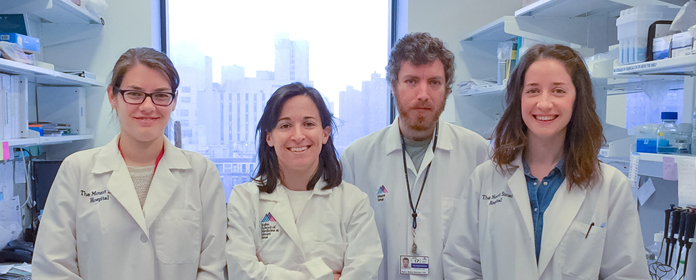Making history in the fight against liver cancer
Amaia Lujambio (Bio 05), studies how to deal with hepatocellular carcinoma, one of the most lethal, at Mount Sinai Hospital, New York.

Amaia Lujambio (Bio 05) has been studying, for more than two years, the effectiveness of a new drug in the treatment of hepatocellular carcinoma, one of the most aggressive tumor types, at the Icahn School of Medicine at Mount Sinai Hospital in New York.
At the age of 34, this graduate in Biology from the University of Navarra has been doing research in the U.S. for more than seven years, first at Cold Spring Harbor Laboratory and then at Memorial Sloan Kettering Cancer Center, trying to find new ways to tackle cancer.
Precisely her latest work at School of Mount Sinai Medicine has focused on hepatocellular carcinoma, which hardly has any therapeutic options for patients in advanced stages, "hence the importance of finding new strategies," says the young scientist. "In this work, published in Gut," she continues, "we have tested a new drug, Palbociclib, which is a cell cycle inhibitor and which is already approved for the treatment of breast cancer. The results in advanced breast cancer are very promising and its toxicity is leave, so we decided to test it in preclinical models of hepatocellular carcinoma".
Treatment for 70% of patientsIn the same laboratory as Amaia, another graduate of the School of Sciences, Marina Ruiz de Galarreta (Bio 08 Bioq 09 and MIB 10), who also received her PhD at the University of Navarra before continuing her degree program at Mount Sinai, is doing her postdoc.
According to the former student of School of Sciences of the University of Navarra, the results show that Palbociclib "is very effective in the models, except in cases that present an alteration Genetics in the Retinoblastoma gene, which is a 'tumor suppressor gene'. In these cases, the carriers do not respond to treatment". "However," he adds, "according to the computational programs of study the new treatment could be applied to at least 70% of patients with this liver cancer and, especially, to those who do not respond to conventional Sorafenib treatment, or who do not tolerate it due to its toxicity."
At present, the team led by Lujambio (which is mainly made up of Spanish researchers) is still carrying out the additional experiments needed before making the leap to test in patients. "In these findings we must be especially cautious and not fail to mention that these are very promising results, but still preliminary," warns the scientist from Navarra. The first author of the published work , Julien Bollard, is now in Lyon studying neuroendocrine tumors.
In 2015 Amaia Lujambio received the AASLD Pinnacle Research Award in Liver Diseases, awarded by the American Liver Disease association to support her work from research through a three-year scholarship .
